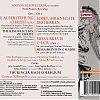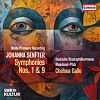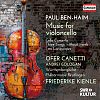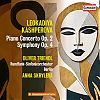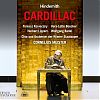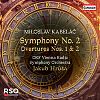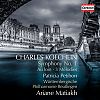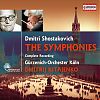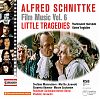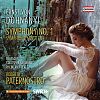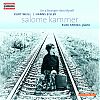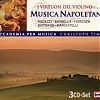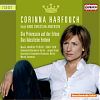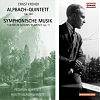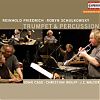cd

CH. GRAUPNER
Hübner · Johannes Hill · Jan Jerlitschka · capella vocalis Boys’ Choir · PULCHRA MUSICA BAROQUE ORCHESTRA · CHRISTIAN BONATH
Die Furcht des Gerechten
Kantate zum Gründonnerstag, GWV 1126/33 (1733) / Cantata for Holy Thursday
Eröffnet euch ihr Augenquellen
Kantate zum Karfreitag, GWV 1127/25 (1725) / Cantata for Holy Friday
Der Sieg ist da
Kantate zum 1. Ostertag, GWV 1128/43 (1743) / Cantata for the 1st Day of Easter
Ihr werdet traurig sein
Kantate zum 2. Ostertag, GWV 1129/19 (1719) / Cantata for the 2nd Day of Easter
In 1711 Graupner was already appointed court conductor and he would continue to work in Darmstadt for the rest of his life. Graupner’s focus shifted to sacred vocal music, which explains the sheer abundance of the 1,400-plus cantatas he composed. In 1723 the Leipzig city magistrates were looking for a new cantor at the Thomas School – and wanted him, above all. Alas, Graupner’s patron did not release him from his contract an so they had to hire Bach. Graupner, famous and widely celebrated during his lifetime, was soon thereafter forgotten. As we rediscover and hear more and more of his works, however, the judgement of his contemporaries would appear to us as increasingly germane. The present recording spans the liturgical arc from Maundy Thursday via Good Friday and Easter Sunday to Easter Monday and presents one liturgical work for each of the festive days – and each of them a world premiere recording!
Hörprobe
Weitere Bilder

ANTON SCHWEITZER
Thüringer Bach Collegium · Gernot Süßmuth
Only few testimonies provide us any details about this now little known but once esteemed composer. Born in Coburg, 1735, Anton Schweitzer died 1787 in Gotha, where he had settled following the Weimar palace fire in 1774. Regrettably, only relatively few manuscripts have survived. Some of the works recorded here (which comprise almost the entire existing church music) have been preserved in several copies, which were recently found in different archives in Thuringia. This recording shows us a colorful virtuoso music of an unjustly forgotten composer.
Youtube
Weitere Bilder

PANCHO VLADIGEROV EDITION: Orchestral Works 2
BULGARIAN NATIONAL RADIO SYMPHONY ORCHESTRA · ALEXANDER VLADIGEROV
[2] – [8] Seven Symphonic Bulgarian Dances, Op. 23
[9] Rachenitsa, Op. 18
[10] – [13] Bulgarian Suite, Op. 21
[5] – [6] Two Romanian Symphonic Sketches, op. 39
[7] Balkan Dance, op. 46
[8] – [11] Four Waltzes for Orchestra
[12] Danza primordiale op. 53
[13] Foxtrott
[14] Hora Staccato (o.op)
[15] Bonus-Track: Pancho Vladigerov Interview
Hörprobe
Weitere Bilder

GEORGI CATOIRE
Oliver Triendl · Vogler Quartett · Rundfunk-Sinfonie-Orchester Berlin · Roland Kluttig
“Now I have come across someone who really has a great creative talent.” (Peter Tchaikovsky)
Although the originality of his musical language paved the way for Russian modernism, Catoire's work still followed the artistic ideals of Russia and not the new culture of the Soviet Republic. His work is highly expressive and of enormous polyphonic density, greatest expressiveness, fine colors, rhythmic and harmonious scope. Catoire's music was almost never performed and his name remained almost unknown also to expert circles. He left behind 36 works including some symphonic pieces, a piano concerto, chamber music, songs and piano cycles. This music was written in the “fin de siecle”, with its shine and nobility, but also with its fragility.
Hörprobe
Weitere Bilder

KARLSRUHER SCHULE
with: Reinhold Friedrich · Frank Dupree · Benedict Kloeckner · Sontraud Speidel · Martin Ostertag · Radiophilharmonie Saarbrücken
recreative phenomenon of this artistic freedom, extending far into a shared future. In the music of alumni taught by Wolfgang Rihm, ideals of musical freedom and openness continue to resound in concrete form. Jörg Widmann, Rebecca Saunders and Markus Hechtle, among others, contribute to the further development of the unique Karlsruhe School at their professional homes.
Booklet-Errata zur CD „Velte. Rihm. Karlsruher Schule“
(Capriccio C7367, UPC 845221073675)
• Die Quelle des biographischen Texts von Eugen Werner Velte auf dem Seiten 18-20 sowie der englischen Fassung auf den Seiten 50-51 ist
https://de.wikipedia.org/wiki/Eugen_Werner_Velte
(abgerufen am 18.12.2019)
• Der Wikipedia-Text wurde für das Booklet von Sontraud Speidel geringfügig ergänzt, sie ist jedoch nicht die Autorin des Artikels.
Errata in the booklet of the CD „Velte. Rihm. Karlsruher Schule“
(Capriccio C7367, UPC 845221073675)
• The source of the biographical text about Eugen Werner Velte on pages 18-20 (german version) and pages 50-51 (english version) is
https://de.wikipedia.org/wiki/Eugen_Werner_Velte
(accessed 2019-12-18)
• The wikipedia text was slightly expanded for the booklet by Sontraud Speidel. However, she is not the orginal author of the full text.



